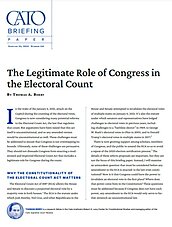1. 3 U.S.C. § 15.
2. See Congressional Research Service, “Counting Electoral Votes: An Overview of Procedures at the Joint Session, Including Objections by Members of Congress,” December 8, 2020, pp. 6–7; Brenna Williams, “11 Times VP Biden Was Interrupted during Trump’s Electoral Vote Certification,” CNN.com, January 6, 2017.
3. See, for example, Kevin R. Kosar, “Why the Electoral Count Act Needs Reform: A Q&A with Matthew Seligman,” AEIdeas, July 20, 2021; Claudia Grisales, “House Panel Issues First Proposed Reforms to Electoral Count Act after Jan. 6 Attack,” NPR, January 14, 2022; and Sara Swann, “Poll Finds Bipartisan Support for Reforming Electoral Count Act,” Fulcrum, October 28, 2021.
4. Vasan Kesavan, “Is the Electoral Count Act Unconstitutional?,” North Carolina Law Review 80 (2002): 1653.
5. Jack Beermann and Gary Lawson, “The Electoral Count Mess,” Boston University School of Law, Public Law Research Paper no. 21–07, September 28, 2021.
6. J. Michael Luttig and David B. Rivkin Jr., “Congress Sowed the Seeds of Jan. 6 in 1887,” Wall Street Journal, March 18, 2021.
7. U.S. Const. amend. XII.
8. Joseph Story, Commentaries on the Constitution of the United States, vol. 3 (Boston: Hilliard, Gray, and Company, 1833), § 1464.
9. 18 Cong. Rec. 48, statement of Rep. Cooper, December 8, 1886.
10. 18 Cong. Rec. 50, statement of Rep. Adams, December 8, 1886.
11. U.S. Const. art. I, § 4, cl. 1.
12. U.S. Const. art. II, § 1, cl. 4.
13. Kesavan, “Is the Electoral Count Act Unconstitutional?,” p. 1748.
14. See Kesavan, “Is the Electoral Count Act Unconstitutional?,” p. 1793.
15. See Kesavan, “Is the Electoral Count Act Unconstitutional?,” p. 1808.
16. See Kesavan, “Is the Electoral Count Act Unconstitutional?,” pp. 1723–29.
17. 3 U.S.C. § 15.
18. 18 Cong. Rec. 50, statement of Rep. Adams, December 8, 1886.
19. 18 Cong. Rec. 30, statement of Rep. Caldwell, December 7, 1886. This provision is most famous as the reason that Dick Cheney moved from Texas to Wyoming in 2000, so that Texas’s electors could permissibly vote for both him and the Texan George W. Bush.
20. Kesavan, “Is the Electoral Count Act Unconstitutional?,” p. 1802.
21. Kesavan, “Is the Electoral Count Act Unconstitutional?,” p. 1807.
22. Kesavan, “Is the Electoral Count Act Unconstitutional?,” p. 1779.
23. Kesavan, “Is the Electoral Count Act Unconstitutional?,” p. 1774.
24. Kesavan, “Is the Electoral Count Act Unconstitutional?,” p. 1775.
25. U.S. Const. art. I, § 5, cl. 1.
26. See Kesavan, “Is the Electoral Count Act Unconstitutional?,” pp. 1752–56.
27. See Kesavan, “Is the Electoral Count Act Unconstitutional?,” p. 1776.
28. This type of “gap filling” is not unique to the electoral count. For example, the Constitution uses similarly sparse language in demanding that the president “shall from time to time give to Congress information of the State of the Union.” U.S. Const. art. II, § 3, cl. 1. When exactly that occurs, and whether it is delivered by letter or in person before Congress, is contingent on a concurrent resolution passed by both the House and Senate before each such address, which invites the president to speak before Congress at a particular date and time.
29. See Beermann and Lawson, “The Electoral Count Mess,” pp. 11–12.
30. In a recent essay, however, Matthew Seligman argues that the Constitution’s text precludes giving any counting role to the vice president. He reasons that “the switch from the active voice (for the opening of the certificates) to the passive voice (for the counting of the votes) indicates that the person or entity counting the votes is different than the person opening the certificates—and so, it isn’t the President of the Senate who counts.” Matthew Seligman, “The Vice President’s Non-Existent Unilateral Power to Reject Electoral Votes,” January 6, 2022, p. 13 (emphasis in original).
31. U.S. Const. art. I, § 5, cl. 2.
32. See Kesavan, “Is the Electoral Count Act Unconstitutional?,” pp. 1779–87.
33. See, for example, Aaron-Andrew P. Bruhl, “Using Statutes to Set Legislative Rules: Entrenchment, Separation of Powers, and the Rules of the Proceedings Clause,” Journal of Law and Politics 19 (2003): 345, 407–08.
34. Further, as Derek Muller has noted, the current Congress did in fact pass a concurrent resolution adopting the text of the ECA as its operating procedure shortly before the most recent count. See Derek Muller, “Rebutting Some of the Claims in the Eastman Memo about Congress’s Role in Counting Electoral Votes,” Election Law Blog, September 21, 2021.
35. See Kesavan, “Is the Electoral Count Act Unconstitutional?,” p. 1717.
36. U.S. Const. amend. XII.
37. Kesavan, “Is the Electoral Count Act Unconstitutional?,” p. 1719.
38. Kesavan, “Is the Electoral Count Act Unconstitutional?,” p. 1772.
39. Beermann and Lawson, “The Electoral Count Mess,” p. 23. This point significantly distinguishes Beermann and Lawson’s view from that of Trump adviser John Eastman, who argued in a since-revealed memo not only that the vice president is the sole legitimate counter, but also that the vice president’s determinations are “nonjusticiable political questions” and that the vice president is thus “the ultimate arbiter.” See Muller, “Rebutting Some of the Claims in the Eastman Memo.”
40. See Kesavan, “Is the Electoral Count Act Unconstitutional?,” pp. 1717–18n271.
41. See Derek Muller, “Electoral Votes Regularly Given,” Georgia Law Review 55 (2021): 1529, 1537–40.
42. See Stephen A. Siegel, “The Conscientious Congressman’s Guide to the Electoral Count Act of 1887,” Florida Law Review 56 (2004): 541, 584–89.
43. See Siegel, “The Conscientious Congressman’s Guide,” pp. 579–84.
44. See Siegel, “The Conscientious Congressman’s Guide,” p. 670.
45. See, for example, Andy Craig, “What Changes Should Be Made to the Electoral Count Act?,” Cato at Liberty, January 12, 2022.


